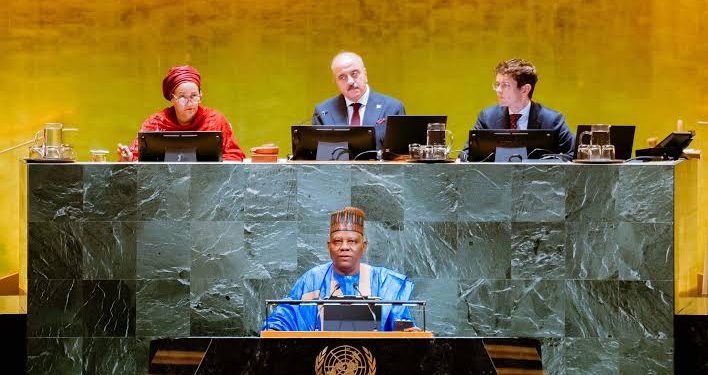Nigeria has renewed calls for urgent reforms to the global financial system, advocating for sovereign debt relief and fairer access to trade and financing for developing nations.
Speaking at the 80th session of the United Nations General Assembly in New York, Vice President Kashim Shettima outlined Nigeria’s vision for a more inclusive international economic order — one that enables emerging economies to move beyond raw material exports and build sustainable growth.
“Nigeria and Africa have made significant strides in recent years to put our affairs in order. We can take that progress to the next level, a level that presents new opportunities for trade, investment, and profit, if we can access reforms to strengthen the international financial architecture,” Shettima said.
He stressed that debt relief should not be seen as charity but as a strategic pathway to global peace and prosperity.
Shettima proposed the creation of a binding international mechanism to manage sovereign debt, describing it as “a sort of International Court of Justice for money.” Such a framework, he argued, would help developing nations break free from economic dependence on primary production and unprocessed exports.
Referencing the Lagos Action Plan, a blueprint for African self-reliance, he called for renewed focus on local value addition in agriculture, solid minerals, and petrochemicals. He also praised the African Continental Free Trade Area (AfCFTA) as a milestone in regional cooperation and reaffirmed Nigeria’s commitment to the Sustainable Development Goals (SDGs).
On Africa’s vast mineral wealth, Shettima called for responsible investment and development. “Africa, and I must include Nigeria, has in abundance the critical minerals that will drive the technologies of the future,” he said, warning that competition over strategic resources has historically fueled conflict, from Sierra Leone in the 1990s to Sudan today.
He urged international investment in exploration, development, and local processing of these minerals within Africa, noting that such efforts would diversify global supply chains, ease geopolitical tensions, and promote peace. “We know in Nigeria that we are more stable when those communities that have access to key resources are able to benefit from those resources,” he added, referencing lessons from the Niger Delta.
Shettima concluded by advocating for a fairer global system where resource-rich nations benefit equitably from their assets. “I believe that we will strengthen the international order when those countries that produce strategic minerals benefit fairly, in terms of investment, partnership, local processing, and jobs,” he said. “When we export raw materials, as we have been doing, tension, inequality, and instability fester.”
His speech comes as Nigeria intensifies its push for a permanent seat on the United Nations Security Council. Foreign Affairs Minister Yusuf Tuggar also revealed that Nigeria will champion a United Nations Global Convention on Taxation, a key component of efforts to reform the global financial architecture.










